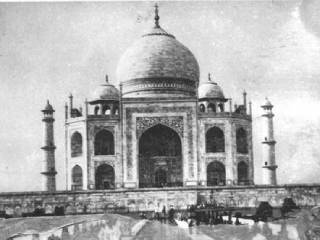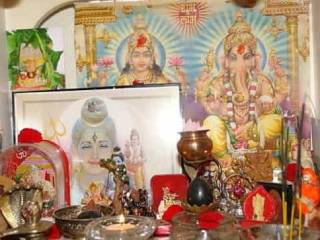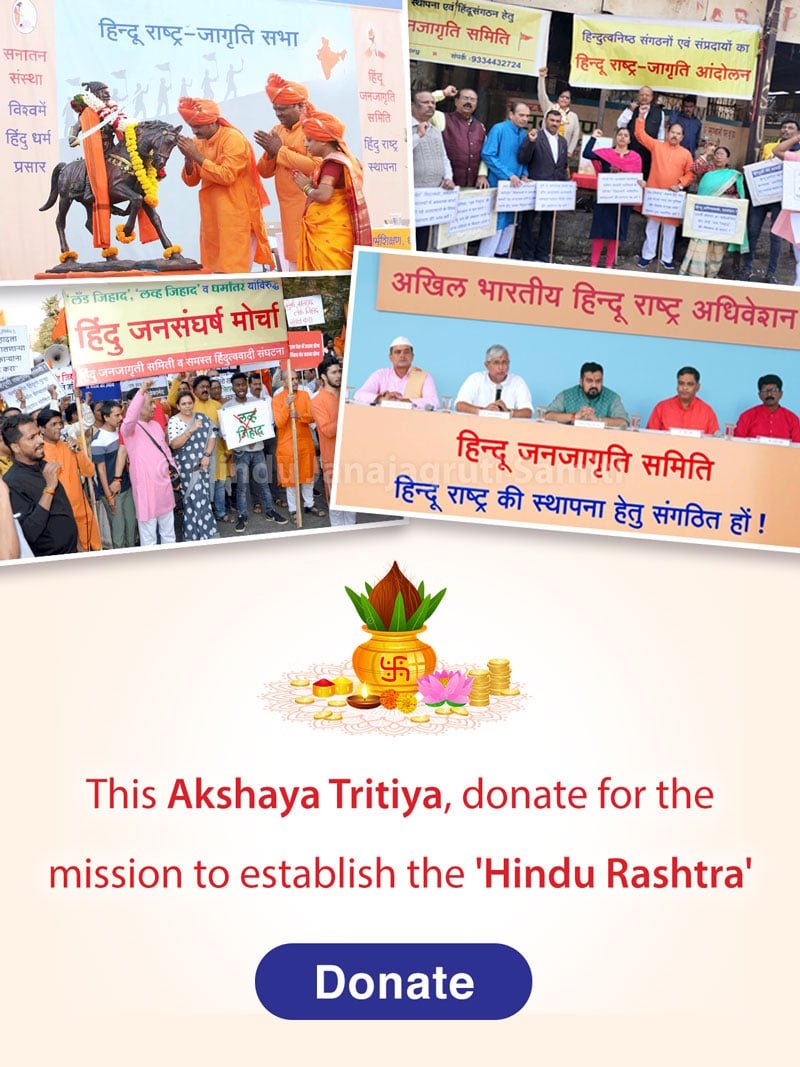Shri. Milind Gadgil, Senior war journalist, Mumbai.
In the era when modern comforts and means were yet to be discovered, Hindustan had the major share of 40% of the world’s international trade. Hence, even today we come across glimpses of Hindu culture in various parts of the world. A study of trade and economics will show that the Hindu religion and culture held sway over the world. Senior war journalist Shri. Milind Gadgil spoke on this subject at the 7th anniversary of the Mumbai edition of ‘Daily Sanatan Prabhat’. The remaining part of the speech is being published below.
Hindustan’s trading practices were just, thus, the Hindu Culture survived without any obstruction all over the world!
80 kilometers north of Bangkok is a city called Ayodhya. A river called ‘Shaufry’ flows near the city. The original name of the river is Sharayu. The local people believe that the Ramayana took place in Thailand, and not in India. A remarkable fact is that the personal bank account of Thailand’s Royal Family is in the reputed bank called ’Bank of Ayodhya’. Thailand has branches of all major global reputed banks; hence, it is not as if the Royal Family has no other option. Added to this is the fact that the Thai currency is basically convertible (no restriction on conversion of local currency to foreign currency), and hence, the Royal Family could have chosen any other bank. Yet, the Royal Family continues to bank with the ‘Bank of Ayodhya’!
In Thailand there is a theatre, which conducts performances of ‘Ramkiyan’, similarly to the ‘Ramleela’, 365 days of the year, and it attracts many viewers. What is the reason for this cultural effect being preserved? It is the just trade practices of the Hindus. Had Hindus resorted to unjust practices, then from the moment new traders from Hindustan stopped visiting Thailand, the local people would have thrown away the practices they had inculcated from Hindu culture and revived their local culture. But they did not do this. They accepted the Hindu culture as their own. This drives home the greatness of our culture.
The trading continued even during war time!
There were many kings in Hindustan; and at that time these kings used to often be at war with each other. All of them did not have friendly relations with each other, but in spite of being at war, there was never a break in their trade. Trading and movement of goods from one part of India to the other continued without restriction and break throughout Hindustan. The pilgrims too could travel without restriction. Never was there a thought of who was ruling in a particular place. This proves the falsehood of the misleading propaganda by the communists that ‘Bharat became united because of the British’. The country was united in the context of trade for thousands of years before the British came. Similarly, it was united in and through religion. Although it is true that during the British rule there was political unification of Bharat, the propaganda of the communists and socialists that ‘there was no nation called Bharat and it comprised of separate kingdoms’ is completely false. Secondly, even though these kingdoms were separate, they accepted each others currency and exchange of mutual currencies was freely accepted. That is why the port of Surat was a port of 80 flags. That means the ships of every country flew the flags of their country. Here the ships of at least 50 -60 countries with perhaps 10 -20 local ships were docked. And each conducted business in their own currencies. There were many people involved in the profession of money exchange. In Gujarati they were called ‘Nanavati’. Later on, this became a surname. Presently there are numerous families who have this name, proving the magnitude of this trade.
The proud accomplishment of the People’s protector Chattrapati Shivaji Maharaj!
Some things would surprise you even today. Of all the varieties of desiccated coconut (copra) being traded throughout the world, that of Rajapur has a special importance. In the list of goods traded in the international market, under the various types of copra, ‘Rajapur Copra’ is separately listed. This Rajapur Copra would not have enjoyed this independent status in the international market for all these years unless it had some special quality. The British had a warehouse at Rajapur. They bribed the local traders and through them acquired the copra from the farmers at extremely low prices. At that time there were no communication facilities. The farmers did not have the financial capacity to send the produce to a different market place to get a better price. Therefore they were helpless, and had to bear terrible losses. They wrote to Chattrapati Shivaji Maharaj about this. Chattrapati Shivaji Maharaj immediately imposed a penal import duty of 200 % on the goods the British were sending through his kingdom, increasing its price, so that the goods could not be sold. This hurt the British, and the sale of their goods declined. So the English wrote a letter to Chattrapati Shivaji Maharaj, asking him for mercy, and reduction in import duty. Chattrapati immediately wrote back saying that he was prepared to lift the tax on the one condition that they would make good the harm done to the farmers of Rajapur. He promised to lift the import tax only after receiving confirmation from the farmers about having received adequate compensation. The British had to withdraw. Next day onwards they contacted the traders and through them gave the appropriate price for the goods and adequate compensation for the damage caused to the farmers. Thereafter the farmers informed Chattrapati Shivaji Maharaj that they were satisfied with the compensation received for the loss. Only then did Maharaj lift the import duty.
Anti-Hindu propaganda of the Hindu – hating Communists!
Thus, Indian products were in such great demand. From 1410 to 1428, that is even before the arrival of Vasco Da Gama, a Chinese ‘chacha’ named ‘Fung Wah’ roamed the Arabian Sea so that he could catch the traders trading in these goods and collect ransom; he used to collect 5% ransom from these traders. The Hindustani traders could afford to pay Fung Wah 5% and still do business. There is no reference of anyone filing a complaint against him either. This Fung Wah finally died in Calicut. His grave is in Calicut; although there appears to be some dispute about it. In the period 1410 to 1428, the businessmen found it profitable to do business even after giving 5% tax to the Chinese Fung Wah. This fact showcases the level of supremacy of our business export. When this was so, in the middle period when the rate of development was slightly lowered, the communists in a parody called it ‘the Hindu Rate of Growth’, as if there was no movement in the Hindu economy. As against this, I presented my thesis at the ‘Indian Economy Congress’, where, on the basis of certain historical references, I convincingly proposed that the ‘Hindu Rate of Growth’ means a development rate of greater than 10%, not a meager 3% or 3.5%. This is the ‘Communist Rate of Growth’; because this was Russia’s rate of growth then. I had to fight for some years but now this sarcastic vocabulary has been dropped. All this is entirely the grace of God, that the debasement of the Hindu religion could thus be stopped.
The world trade was far from economic depression until Hindustan was its focal point!
The Hindu religion is being often attacked in various ways, with conversion on one hand and distortion of its history on the other. Hindu religion is being continuously attacked through denigration of our deities, misinterpreting the teachings of our religious books. But in reality, if Hindustan once again becomes the centre of world trade, a just atmosphere would prevail in the business world as before. Even in that, we were being cautious. When there is a period of prosperity, then after some time there is inflation, then remedies are found to prevent inflation because of which the time of prosperity is over. This, in economic language is known as the cycle of depression, prosperity and depression. When this cycle of business happens’ at that time to prevent the world economy from collapsing, the Indian rupee should not get inflated. And for that to happen, foreign currency has to come into India and if it comes in the form of currency coins (metal) then the currency stocks increase and so there is no inflation of currency. Due to the enormous reserve stock in foreign trade, when foreign currency enters in the form of coins, the coin stocks increase and there is inflation. Presently, due to the large inflow of foreign currency, the Reserve Bank of India has had to impose various restraints on this inflow. Similarly, it has to encourage Indian companies and Indian nationals to spend money outside India? This exercise being done by the Reserve Bank is often reported in the daily newspapers. In the ancient times, Indians had found an easy way of handling this problem. The income from the foreign trade was imported into the country in the form of Gold and silver. As local currency was used to buy this gold and silver the currency stock increase was controlled automatically. And so there was no need to devise ways and means of controlling inflation, thus avoiding the danger of the vicious cycle of depression and surplus production. In this manner, for thousands of years, the Hindus ably handled financial administration of the world economy.
Source: ‘ Daily Sanatan Prabhat ‘
Read the following article written by Shri. Milind Gadgil

 Mizoram: EC accepts Christians’ demand to defer counting on Sunday, but what if Hindus had made a similar demand?
Mizoram: EC accepts Christians’ demand to defer counting on Sunday, but what if Hindus had made a similar demand? Sign Petition : Immediately repeal the draconian and unconstitutional ‘The Waqf Act, 1995’
Sign Petition : Immediately repeal the draconian and unconstitutional ‘The Waqf Act, 1995’ Shriram : Sri Lanka’s saviour
Shriram : Sri Lanka’s saviour Why it is so cool to malign Hindu gods and goddesses, but it may not be that easy now
Why it is so cool to malign Hindu gods and goddesses, but it may not be that easy now Shocking Truth of Taj Mahal exposed by Late Pujya P. N. Oak
Shocking Truth of Taj Mahal exposed by Late Pujya P. N. Oak How are Hindus treated in states where they are in a minority?
How are Hindus treated in states where they are in a minority?